
With the exception of drive-in screenings held at the Bronx Zoo, the Brooklyn Army Terminal, and the New York Hall of Science, the 58th annual New York Film Festival has gone virtual, with nearly every picture in the prestigious lineup available for online rental at roughly the price you’d pay to see a picture at a first-run back in the old days. The films stream on the NYFF site, virtual.filmlinc.org, which like the festival itself is hosted by Film at Lincoln Center; the last online screening is scheduled for October 11, though some rentals will remain available for a few days following that.
And while those circumstances don’t necessarily mean that we should be covering it extensively at DigBoston, especially considering all the other locally based film festivals hosting virtual events at the present moment, the fact is that many of our regular film writers—myself quite emphatically included—have spent the past few weeks viewing little other than selections from the NYFF, so here we are.
The films at the fest are placed into one of four different sections: Revivals offers repertory screenings; Spotlight is the place for “sneak previews, gala events, screenings with live elements, and other special evenings”; Currents groups together non-narrative features, short-length films, and various other works on the borderline of what is often called experimental film; and finally the Main Slate presents 25 features, 12 of which are briefly reviewed below. —Jake Mulligan
Lovers Rock
Co-written and directed by Steve McQueen. UK, 2020, 68 minutes.
This year’s main slate included three films from the five-part Small Axe anthology, a series of movies co-written and directed by McQueen that are tied together not by episodic plotting but instead by the common identity of their real and fictionalized characters—the post-colonial West Indies diaspora of African Caribbeans in England from the late 1960s onward. In fact the event began with Lovers Rock, in many ways the perfect festival opener, invoking a communal celebration of good vibes and common interests: to vicariously live through the lens of McQueen’s 1980s London reggae party is a shot in the arm. While there’s certainly a plot skeleton in there—two young people in London’s West Indian community fall in love at a party—the real effect of the film comes from its endless succession of experiential, sensuous, fun hangout-movie details.
Lovers Rock is unlike anything McQueen has directed to date, with a look that’s closer to Jonathan Demme’s egalitarian camera fluidity and creates a similar effect—the ephemeral images cast whole stories onto characters seen for even just a glance. Another point of comparison in that regard would be the little-seen but invaluable French anthology series Tous les garçons et les filles de leur âge…, which featured nine movies including Olivier Assayas’ Cold Water (1994) and Claire Denis’ U.S. Go Home (1994), most of which focused on French-speaking teenagers coming of age around Paris 1968 while consumed by popular culture, music, dancing, and young love. Like that series, Lovers Rock shows crucial moments of revelation, tenderness, desire, and epiphanies on the dance floor while simultaneously maintaining an undercurrent of danger. Still, it’s a warm and compact work that captures a level of euphoria that so often, but especially now, feels out of reach. [★★★★★] —Caden Mark Gardner
Scheduled for release on Amazon Prime starting November 27.
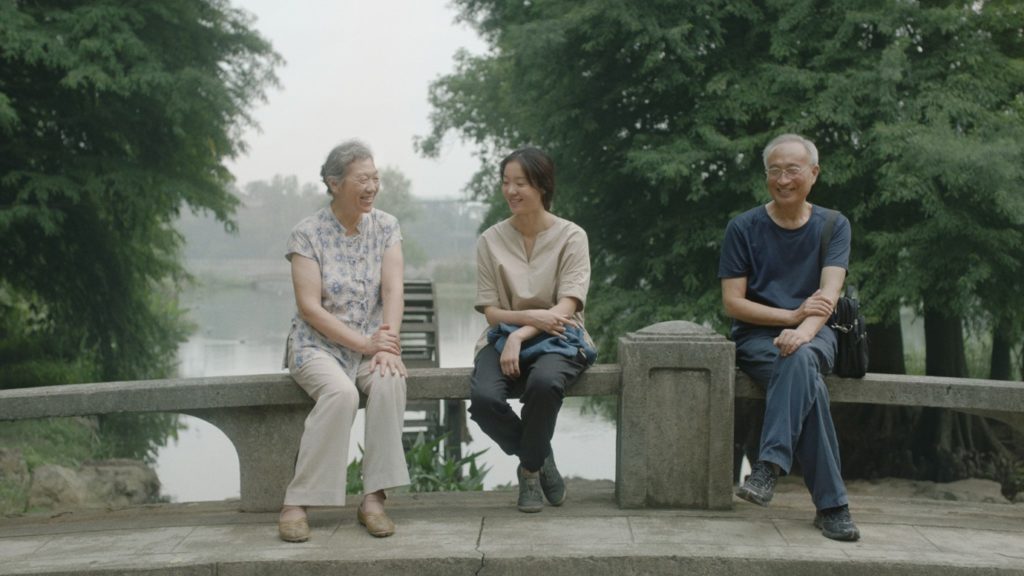
The Calming
Written and directed by Song Fang. China, 2020, 93 minutes.
Depicting the wanderings of a newly-single filmmaker named Lin (Qi Xi) as she exhibits her work and visits loved ones in Japan, Hong Kong, and China, The Calming would seem to reach its high point when the character quietly weeps at the opera—an ostensibly revelatory instance of art-imploding-self that on the page might call to mind Joan Crawford at the piano recital in Autumn Leaves (1956) or Anna Paquin at the finale of Margaret (2011). But this is not a melodrama, not even a little bit, so it plays more like a hiccup. Instead the real centerpiece of Song’s film, her second, is a walk in the parks and forests of Nanjiang that accounts for about ten minutes of screentime and completely fulfills the film’s relaxed lazy-day rhythm; built up prior by a succession of quick and quotidian scenes where Lin gazes out windows, purchases necessities, preps for upcoming screenings, and looks at (other) trees. Dialogue exchanges play in between the more solitary tasks—such as one where Lin, clearly a stand-in for Song on some level, talks with The Calming’s actual co-producer Shôzô Ichiyama—all of them defined by a quiet evasiveness characteristic of the melancholic psychology that quite purposefully clouds over the film, discernible even in its light sound design and zestless photography. Continually framed in eye-level master shots that flatten out its depth, Song’s film eventually achieves a manner that makes it possible to forget that you’re watching it. But nonetheless, my engagement never faltered: Pleasurably genuine moments abound, like one scene in an editing room where Lin hints towards something about to happen in her film, and then it happens, and everyone watching gives an extremely satisfied nod. Like much of The Calming, it’s very human and very unspectacular—and when those qualities intersect, the film seems truer than most. [★★★] —Jake Mulligan
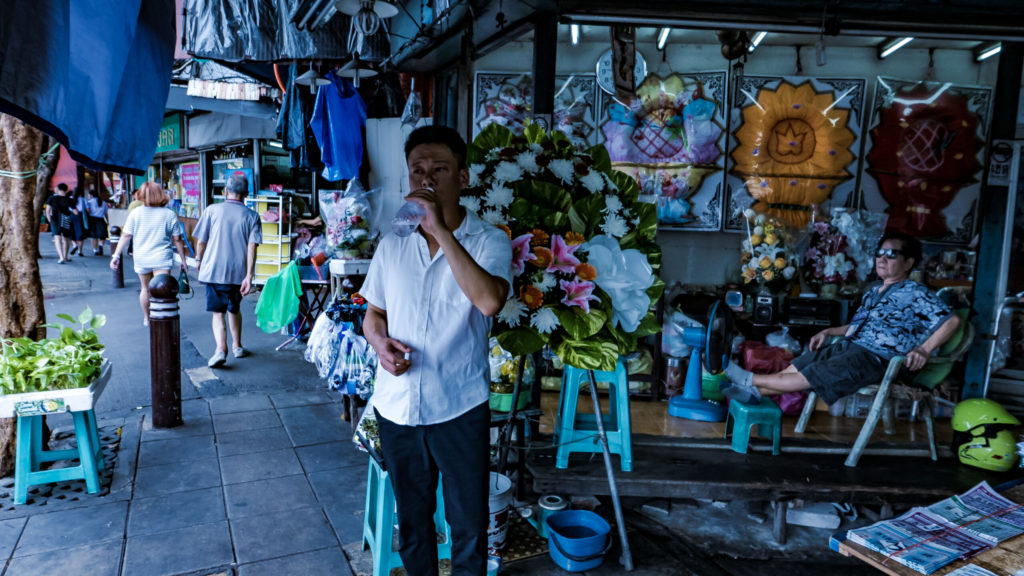
Days
Written and directed by Tsai Ming-liang. France/Taiwan, 2020, 127 minutes.
You know how repeating a word over and over again causes it to lose its meaning? During one of a number of long shots of Lee Kang-sheng’s blank stare in Days, a beautiful quasi-love story from the great Taiwanese filmmaker Tsai Ming-liang, I began to realize how odd the human face looks. That’s no slight on Lee’s face—which is among the cinema’s greatest—but the longer I stared at it, the more my sense of how the eyes, the nose, the mouth, and the ears all come together to form a unified whole started to slip away.
One of the most wonderful aspects of any Tsai film, Days especially, is how it seems to invite the mind to wander like this. Most movies are built to command attention for the entirety of their runtime. Even many slow art films essentially function as a challenge within that same viewership mode, as if saying, how long can you last without losing the thread? But letting go of the instinctive tendency to alertness can be a liberating experience, especially when your attention is unexpectedly drawn back to the work at hand—and suddenly a cat moving across a window sill feels as momentous as the arrival of a train at Le Ciotat in 1895. [★★★★★] —Etan Weisfogel
Scheduled for distribution in 2021.
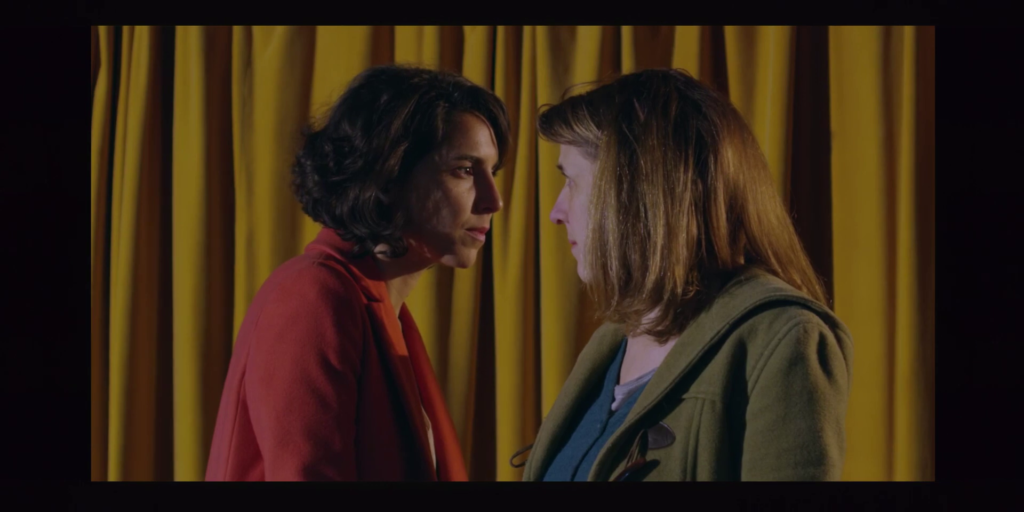
Isabella
Written and directed by Matías Piñeiro. Argentina, 2020, 80 minutes.
It’s been interesting to see Isabella regularly described as Argentinian filmmaker Matías Piñeiro’s most difficult, impenetrable work yet. Relative to the digressive nature of previous films like Viola (2012) or The Princess of France (2014), it contains perhaps his most straightforward narrative—focusing on the emotional arc of a single character, Mariel (María Villar), an actress experiencing a career crisis. As if to adjust for the difference, the always eccentric filmmaker approaches what would otherwise be a fairly uncomplicated story timeline with his most intricate editing structure to date, creating a patchwork of gentle, affecting moments in Mariel’s life across a number of years.
As per usual with Piñeiro’s work, Isabella takes its title from a Shakespeare character, the lead in the lesser-known Measure for Measure. Pablo, auditioning Mariel for the role, describes the play as being about brotherhood; and one might say that Isabella, in contrast, is about sisterhood, specifically the connection between Mariel and her brother’s sometimes-lover Luciana (Agustina Muñoz), another actress. Their complicated relationship, in which mutual appreciation and affection is mixed up with jealousy and resentment as Mariel loses the eponymous role to Luciana, ends up standing in for Mariel’s larger relationship to acting as she approaches middle age. And whenever Isabella threatens to lose itself to arty abstraction, Villar and Muñoz’s electrifying chemistry and instructive understanding of the material quickly ground it. [★★★★] —Etan Weisfogel
Scheduled for distribution in 2021.
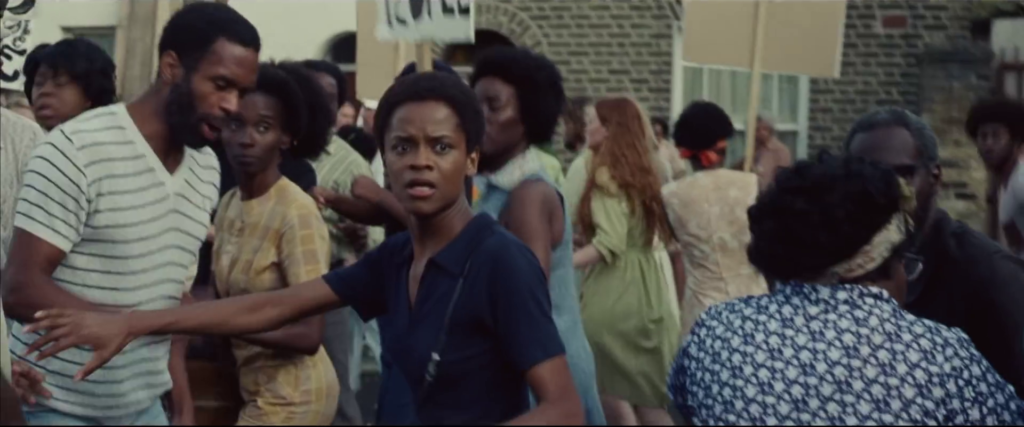
Mangrove
Co-written and directed by Steve McQueen. UK, 2020, 126 minutes.
McQueen’s dramatization of the 1970 Mangrove Nine trial would have seemed like a more practical choice as an opener. It has more recognizable faces (a ferocious cast led by Letitia Wright) and a more by-the-book narrative, depicting the real-life events that led to the owner of the Notting Hill-based Mangrove restaurant and several other Black activists coming under fire by the London authorities (nothing about the restaurant was illegal, but its success enraged white police officers, who did everything in their power to curb and destroy its space and influence). But Mangrove is also, like Lovers Rock before it, pulsating in its righteous anger and indignation, with incredibly precise call-outs on how gentrification and policing function as racist institutions to actively suppress people of color. A highlight in the film is a montage on the industrialization and gentrification of Notting Hill vis a vis the trial set to the late ’60s reggae classic “Skinhead Moonstomp,” putting an exclamation point on it all.
To call the film a courtroom drama almost does it a disservice. The trial presents a direct confrontation of the Mangrove Nine against the absurdity of their charges, more Franz Kafka than Atticus Finch. Perhaps the most McQueen shot in the film is in the immediate aftermath of the Mangrove kitchen being raided by police: The camera stops on a bowl that spins uninterrupted for several seconds, a metaphor for the moment’s place as part of a larger cycle. The world spins over and over with these stories of injustices and racism. Can it ever stop? Who can stop it? Who will stop it? Mangrove shows how these characters fought back, but most disquietingly and necessarily, it makes a point that history is cyclical and that flashpoints of racist violence often have as much to do with capitalism as policing. [★★★★] —Caden Mark Gardner
Scheduled for release on Amazon Prime starting November 20.
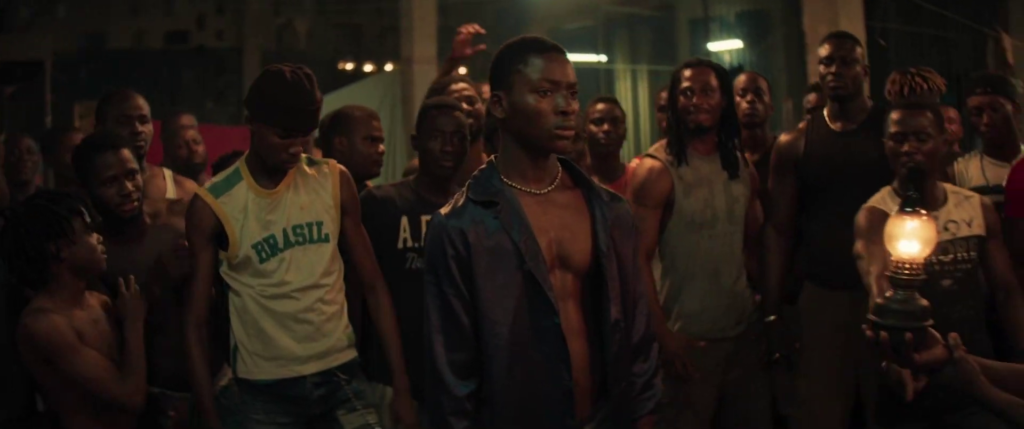
Night of the Kings
Written and directed by Philippe Lacôte. Canada/France/Ivory Coast/Senegal, 2020, 93 minutes.
Rushing through hallways filled with rambunctious prisoners in an Ivorian lockup, Night of the Kings at first seems to be making a full sensory experience of the notorious MACA prison’s culture, language, traditions, abuses, etc. But following that, and a few sub-Puzo scenes of convicted gangsters negotiating their ever-shifting power dynamics, this gleefully macho feature settles into its real deal: A young man from a class of poets and raconteurs is suddenly dubbed Roman (Koné Bakary), placing him at the center of an intermittently-staged prison ritual where he’s gotta tell a story that lasts all night lest he suffer an exceptionally painful death (Denis Levant plays the Magical Honky that lets him in on the concept). Sometimes the edit leaves the prison to depict Roman’s tales in the flesh, but actually this blandly-composed film only finds something worth looking at when it doesn’t cut away—the prisoners surround Roman and perform his story out with a call-and-response chant-slash-dance-slash-pantomime, at some points elevating the picture towards the pleasures of a low-scale musical. But little drama is drawn from what the young man says, just a lot of tired subtext about the power of storytelling. And furthermore, the movie fails its own test. Excessive duration is the whole thing, yet Night of the Kings is barely sketched out, much less spilling over. [★★½] —Jake Mulligan
Scheduled for distribution at a later date.
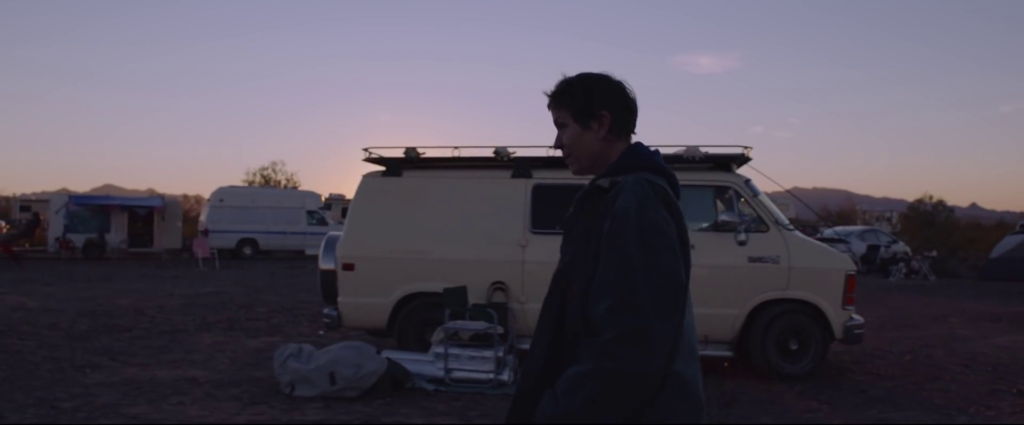
Nomadland
Written, directed and produced by Chloé Zhao. US, 2020, 108 minutes.
Like many a CinemaScope western, Nomadland uses the sweeping vistas of the American West to emphasize how alone we are in the face of vast, unfeeling nature—and how that solitude allows for self-definition. Frances McDormand’s Fern has already come to terms with her own solitude, having lost her Nevada mining town to economic collapse and her husband shortly after. She journeys across state lines for seasonal work, from an Amazon warehouse in the winter to beet farms in the fall, but her travels are as much about exercising her freedom to live and move as they are about earning enough to eat.
Nomadland is grand, playing at a scale that makes it vulnerable to cliche. But the screenplay by Chloé Zhao, whose previous films include Songs My Brother Taught Me (2015) and The Rider (2017), keeps the film grounded in an intimate reality: Adapted from Jessica Bruder’s 2017 nonfiction book about a group of travelers living in camper vans, the film also features many real-life nomads as Fern’s companions and mentors on her journey. It’s a staggering portrait of a community searching for grace after being ravaged by American capitalism, and Zhao’s greatest work yet. [★★★★★] —Cassidy Olsen
Scheduled for theatrical release on December 4.
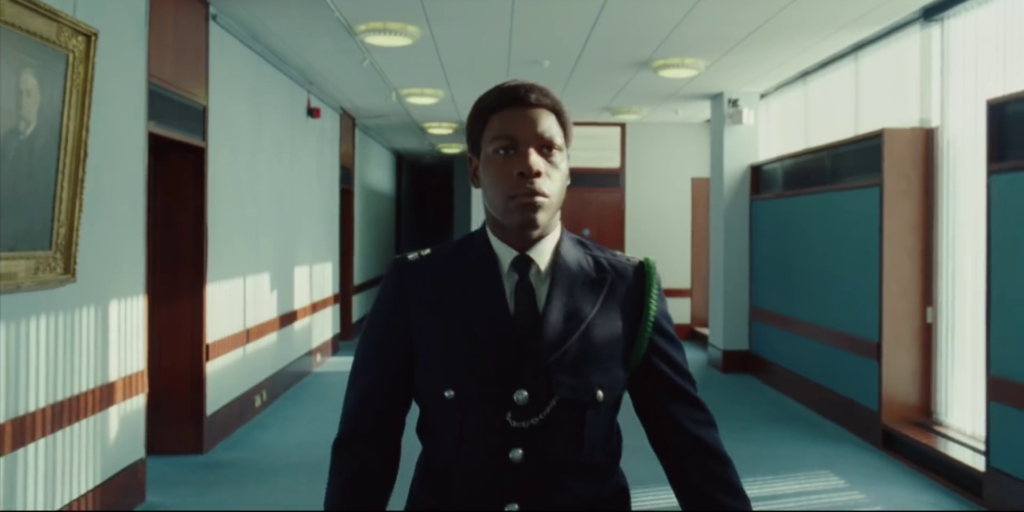
Red, White and Blue
Co-written and directed by Steve McQueen. UK, 2020, 80 minutes.
What is chronologically the last installment of the Small Axe series bookends Mangrove, which’ll be the first one officially released: Where in that film conflict between London-based black activists and the police was the focal point, Red, White and Blue portrays attempts by well-intentioned individuals to change policing from within. In telling the true story of future London Metropolitan Police Superintendent Leroy Logan (John Boyega), McQueen delivers a rich character study, with Boyega giving the sort of a multifaceted movie-star performance that studio films have declined to grant him since ever his breakout in Attack the Block (2011).
Logan’s desire to become a policeman, which stuns and angers his blue-collar father Kenneth (Steve Toussaint), is presented as a response to racism experienced first-hand dating back to his schoolboy years. But it’s also framed as an extension of his work in forensics—seeing policing as an opportunity to solve problems not just on the beat, but also in the force itself. He becomes a star recruit, even used in ads promoting the Metropolitan Police’s diversity, but faces heat from the black community, and becomes the victim of racist attacks by his own colleagues. While many filmmakers would focus more on the triumph of Logan’s three-decade long career (as detailed in a book he just published titled Closing Ranks), McQueen depicts the system beating down on Logan during his early years; more reminiscent of Serpico (1976), or how Alan Clarke’s 80s films (also made for the BBC) captured the rotting institutions of Thatcher-era England. While most cinema and television celebrates the ‘better angels’ fighting corruption with some level of success, Red, White and Blue depicts the rot within policing as being almost completely intractable. [★★★★] —Caden Mark Gardner
Scheduled for release on Amazon Prime starting December 18.
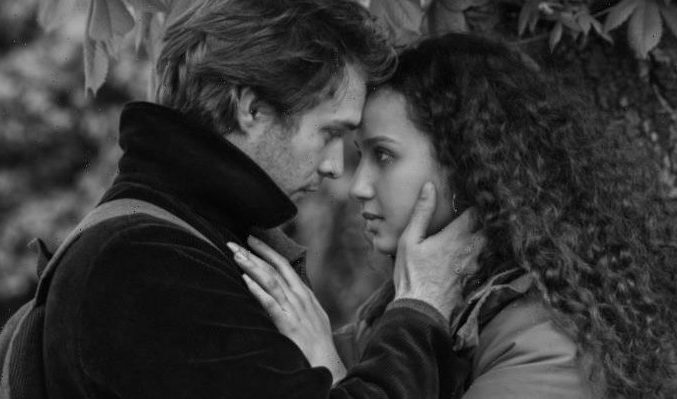
The Salt of Tears
Co-written and directed by Phillippe Garrel. France, 2020, 100 minutes.
In 2018, French President Emmanuel Macron mandated a fine of up to 750 euro for catcalling, a penalty fleetingly invoked in Phillippe Garrel’s The Salt of Tears when the film’s protagonist, the boyish bed-hopper Luc (Logann Antuofermo), gets harangued by a woman he’s been following on a Parisian street. This nod to the evolving #MeToo-inspired social climate notwithstanding, it’s the only moment in this delicate moral tale when Garrel’s (anti-)hero gets any guff for his cavalier mistreatment of women, which is typically of a sort too quotidian and passive to reap any such legal consequence. In lieu of this tangible comeuppance, however, The Salt of Tears metes out a spiritual one.
Relayed in short, precise scenes defined by Garrel’s patented economy of expression and wise deadpan, the film bears stark witness to Luc’s reflexive habit of fucking and chucking his numerous girlfriends—a maddening spectacle I’d forgive you for not wanting to endure, but one suffused by the ever inward-looking Garrel with the tone of an increasingly somber lament. As per usual with the late-period efforts of this New Wave veteran, certain aesthetic principles are obeyed like gospel (black-and-white 35mm widescreen, melancholic midi piano accompaniments), and an omniscient voiceover cuts to the heart of the matter in gems of pithy phrasing, with Garrel and co-screenwriter Jean-Claude Carrière saving their harshest bon mot for a piercing final shot that evokes Carl Dreyer’s Gertrud (1964). [★★★½] —Carson Lund
Scheduled for distribution in 2021.

Swimming Out Till the Sea Turns Blue
Directed by Jia Zhangke. China, 2020, 111 minutes.
It’s almost impossible to overstate the radical changes undergone at every level of Chinese society over the past century—and since his emergence in the 1990s, filmmaker Jia Zhangke has established himself as something like the poet laureate of the country’s various cultural revolutions. His latest film is a homecoming, as Jia sets his sights on Shanxi province where he grew up. Using a local literary festival as the anchor, Jia tenderly examines how the region has changed over three generations: First, he speaks with the elderly, whose manual labor and mutual aid transformed Shanxi province, then with middle-aged artists his own age who grew up in the countryside before decamping to Beijing, and finally with a young generation whose connection to their homeland is frayed. Jia doesn’t mourn the past or glorify the future; his gaze is lucid and clear-eyed, able to see that the world keeps changing, and us along with it. [★★★] —Nathan Smith

The Truffle Hunters
Produced and directed by Michael Dweck and Gregory Kershaw. Greece/Italy/US, 2020, 84 minutes.
Composed in the static, flattened-out manner that has at this point become the prescribed aesthetic of the international festival circuit, The Truffle Hunters is a nonfiction portrait of six or seven people involved with the semi-underground white alba truffle-market of Piedmont, Italy (by far the film’s most distinctive quality is the region’s borderline-medieval appearance, of course framed up to emphasize the pictorial beauty). The warmest scenes depict a trio of the eponymous hunters, and their dogs, and in one case their spouse, as they discuss—between themselves, but really for the camera—the various concerns of their business, which is rife with unwritten rules and threatened by poachers and dog-poisoners. The best scenes, which conjure up a real sense of drama and reality, depict a street-level truffle dealer making quick buys in the area’s grandiose alleys and backways, then selling the batches at high profits to restaurateurs and other rich buyers. And finally the unnecessary scenes, which articulate a point the movie would’ve made just as well without them, show off some of those buyers inspecting the results of the hunt (in his review at Slant Magazine, Carson Lund rightly notes how the film works to puncture some element of the farm to table idea—and indeed the structure pretty clearly suggests that even the most sanctified agrarian practices are corrupted by big capital on the ground level). Breaking up the rhythm are a handful of brief GoPro-style scenes depicting the perspective of the dogs themselves, Youtube vlog-ready footage that’s plainly exciting to a degree that only further reveals just how slight the other sequences are—even those among the human truffle hunters, who collaborate with the filmmakers to present their craft, trade, and lives from such a coy angle that it leaves one with little to engage with beyond an interpretation of their own motivations. [★★½] —Jake Mulligan
Scheduled for theatrical release on December 25.
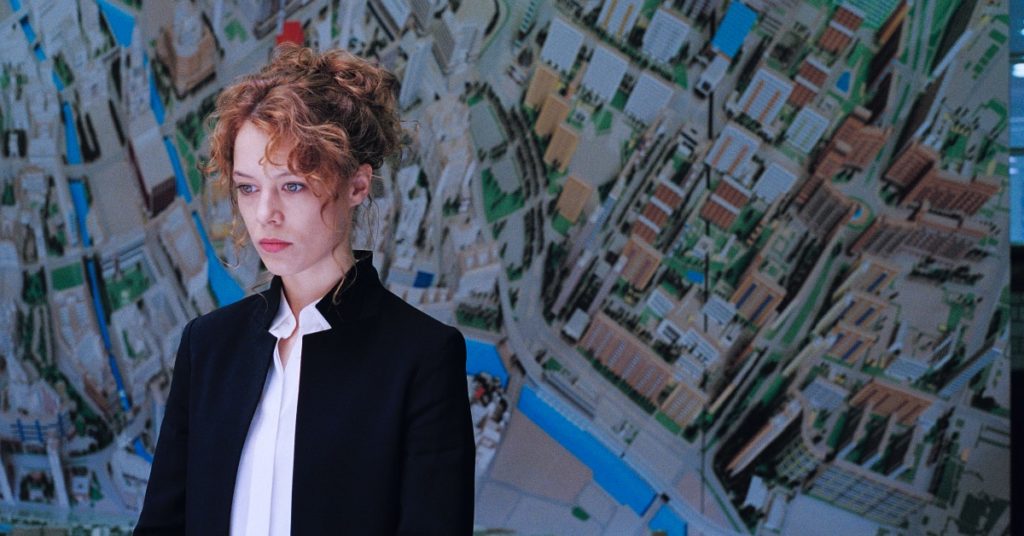
Undine
Written and directed by Christian Petzold. Germany, 2020, 90 minutes.
Two seemingly unrelated metaphors undergird the narrative of Christian Petzold’s Undine: Berlin’s turbulent history of rupture and reunification, and a 15th-century European myth about a water nymph who must marry on land to acquire a human soul. The former is right there in the text, lectured on by the eponymous heroine in her role as a museum chaperone, while the latter is kept discreet, impacting the film’s fairy tale-tinged story in more subtle ways. It’s an odd mix, especially in light of Petzold’s usual understatement with regard to historical allusion—but the German auteur is one of our niftiest genre filmmakers, and while Undine’s thematic ambitions ultimately amount to a muddle, its immediate impact as a tragic romance is unmistakable. Petzold regulars Franz Rogowski and Paula Beer seem genuinely hot for each other as the doomed lovers, somehow especially when using municipal and architectural discourse as precoital chatter. A number of elegant perspective shifts keep the otherwise familiar story moving, until a startling accident and a leap in time overlay a cosmic dimension to the film’s take on the inevitability of loss. [★★★] —Carson Lund
Screening online via NYFF from October 9-14 at 8pm. Scheduled for distribution at a later date.
Dig Staff means this article was a collaborative effort. Teamwork, as we like to call it.

